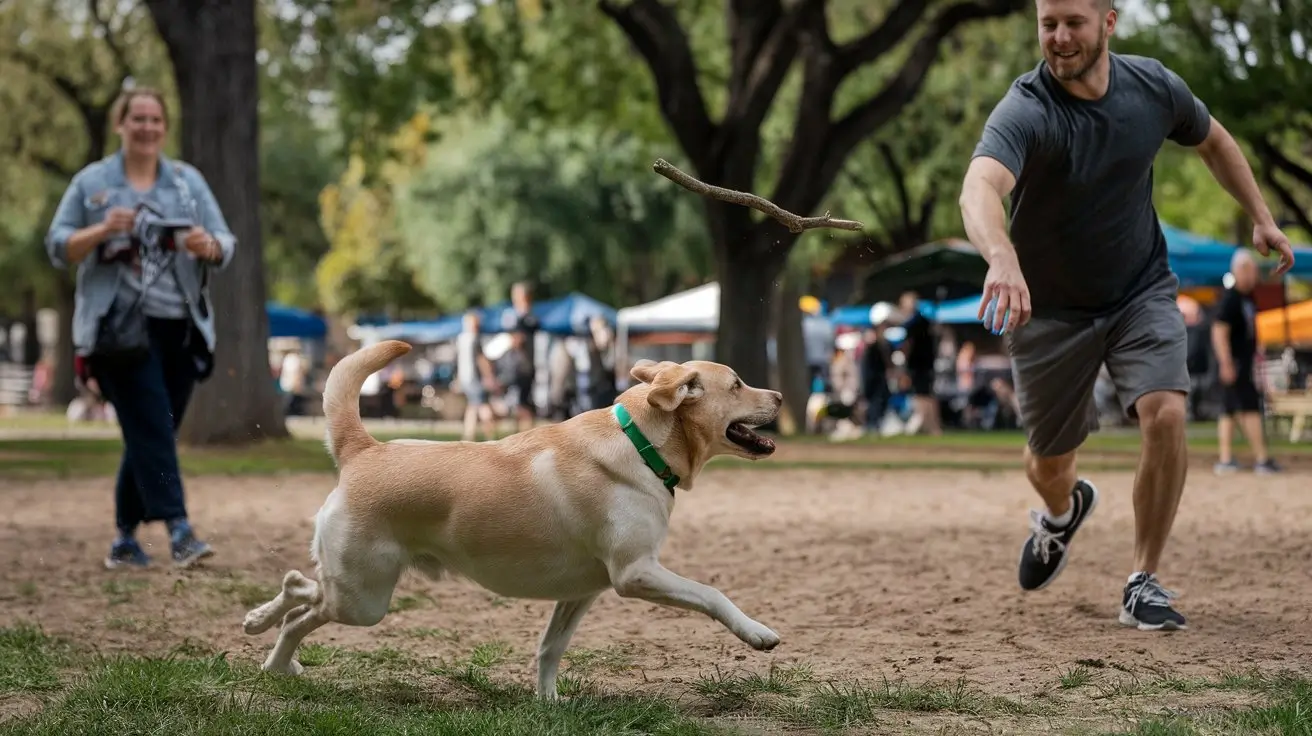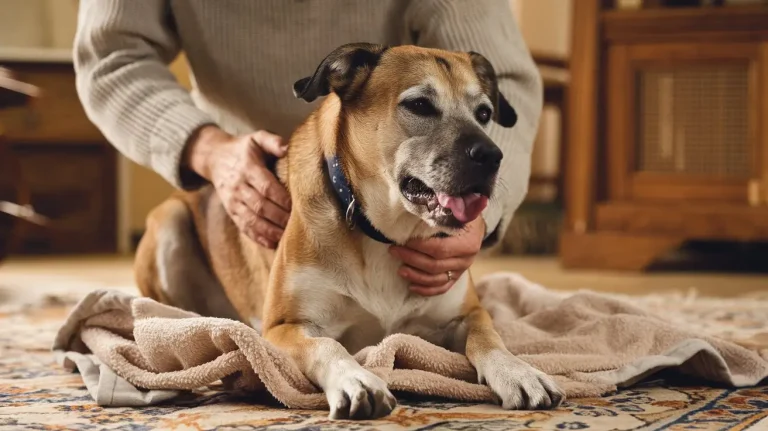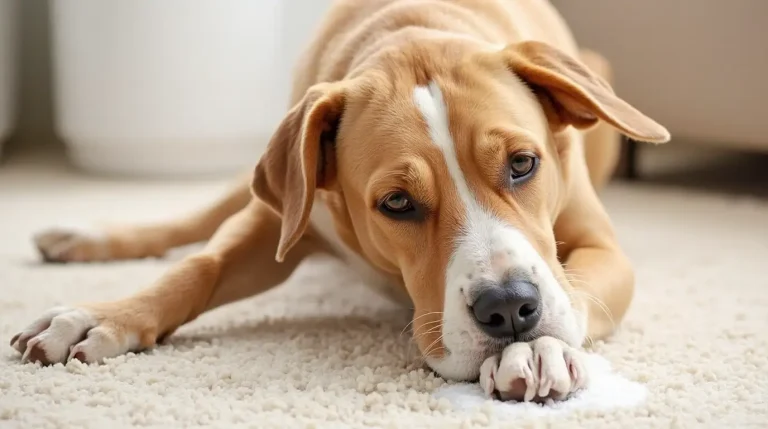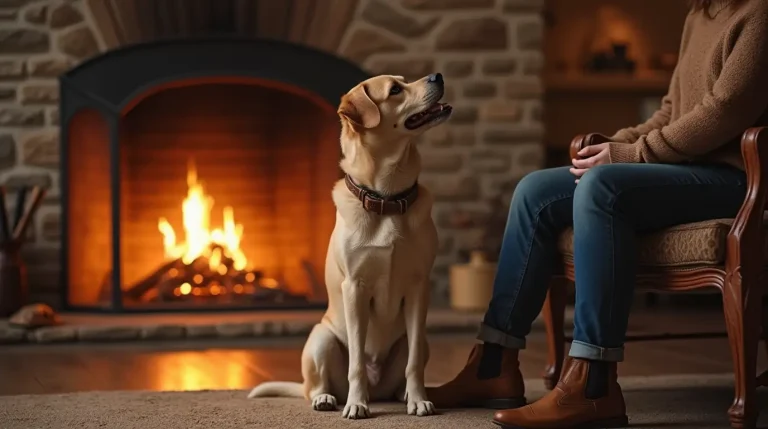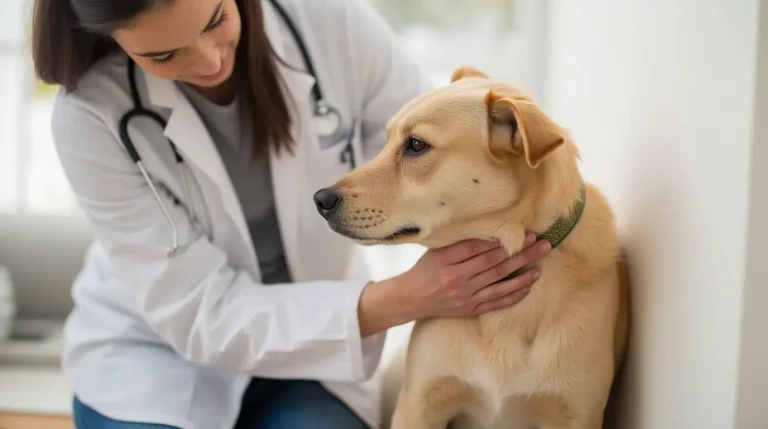It can be alarming when you notice your dog has diarrhea, especially if they are otherwise acting fine. You might wonder if you should be concerned or if it’s just a minor issue that will pass. While diarrhea in dogs can sometimes be a sign of a more serious health problem, it’s not always something to panic about, especially if your dog is still playful, eating well, and acting normally. In many cases, mild digestive upset can happen without any other symptoms, and it might not require immediate veterinary attention. Understanding the potential causes of diarrhea, when to seek help, and how to care for your dog at home can help ease your worries. In this post, we’ll explore the common causes of diarrhea in dogs, signs that may indicate a more serious issue, and what you can do to help your dog feel better.
Table of Contents
Common Causes of Dog Diarrhea (When Your Dog Is Acting Normal)
Diarrhea in dogs is a relatively common issue, and in many cases, it’s nothing to be overly concerned about, especially when your dog is still behaving normally. Understanding the potential causes of diarrhea can help you determine whether it’s a mild issue that will resolve on its own or something that needs closer attention. Here are some of the most common reasons dogs might experience diarrhea without any other concerning symptoms:
1. Dietary Changes and Food Sensitivities
One of the most common causes of diarrhea in dogs is a sudden change in their diet. Whether it’s a new type of dog food, a change in feeding schedule, or the introduction of treats or table scraps, your dog’s digestive system may not react well to the shift. This can lead to mild gastrointestinal upset, including diarrhea.
Additionally, some dogs may have food sensitivities or mild allergies to certain ingredients. Common culprits include dairy, grains, or specific proteins. If your dog is eating a new food or you’ve recently altered their diet, this could be the cause of their diarrhea, even if they are otherwise energetic and playful.
2. Ingesting Something They Shouldn’t
Dogs are notorious for eating things they find around the house or on walks that they shouldn’t. This might include foreign objects like toys, plastic, or fabric, or substances like garbage, spoiled food, or plants. While some of these items may pass through their system without issue, others can cause temporary digestive upset, including diarrhea. If you’ve noticed your dog munching on something they shouldn’t, it’s possible that the diarrhea is their body’s way of responding to something foreign.
3. Parasites
Parasites like Giardia, roundworms, or hookworms can infect your dog’s digestive tract and lead to symptoms such as diarrhea. While more serious parasitic infections can cause other symptoms like lethargy, vomiting, and loss of appetite, some dogs may only show diarrhea as a sign of infection. If your dog has been exposed to contaminated water or other animals with parasites, it’s possible that they could develop diarrhea without displaying any additional signs of illness.
4. Stress or Anxiety
Just like people, dogs can experience gastrointestinal disturbances due to stress. Changes in their environment, routine, or even their interactions with other pets or people can cause an upset stomach. A dog who’s experiencing anxiety or stress may develop diarrhea, yet still seem relatively unaffected in terms of their energy levels and playfulness. This is especially common during periods of travel, moving to a new home, or changes in the household dynamics (e.g., a new pet or family member).
5. Mild Bacterial Infections
Bacterial infections can also cause diarrhea in dogs, though they’re typically accompanied by other symptoms like lethargy or vomiting. However, in some cases, a mild bacterial infection might only result in diarrhea without noticeable changes in your dog’s behavior. Common bacterial culprits include Salmonella and Campylobacter, but they’re more likely to cause more severe symptoms if left untreated. Mild bacterial infections can sometimes resolve on their own, but if diarrhea persists, a trip to the vet may be necessary.
6. Changes in Routine or Exercise
A sudden change in your dog’s exercise routine, like an increase in physical activity or a different type of play, can lead to gastrointestinal upset. This is often because physical exertion can disrupt the digestive process, especially if your dog eats shortly before or after exercise. If your dog is acting fine and still energetic but experiences a bout of diarrhea, consider whether they’ve been more active than usual or if they’ve eaten too quickly after exercise.
7. A Reaction to Certain Medications or Supplements
If your dog has recently been prescribed medication or started taking a new supplement, it’s possible that the diarrhea is a mild side effect. Some medications, like antibiotics or dewormers, can alter the balance of bacteria in the gut, leading to diarrhea. Similarly, certain supplements (like those for joint health or digestive aids) can sometimes upset your dog’s stomach. If this is the case, consult your veterinarian about adjusting the dosage or changing the treatment plan.
8. Overeating or Eating Too Quickly
If your dog has overeaten, whether it’s a large portion of their regular food or a treat that was too rich, their digestive system may react with diarrhea. Similarly, dogs that eat too quickly—often referred to as “fast eaters”—can sometimes experience diarrhea due to their stomach not processing the food properly. Some dogs even gulp air when they eat too quickly, which can contribute to digestive upset.

When Should You Be Concerned About Your Dog’s Diarrhea?
While diarrhea in dogs can often be a mild and self-limiting issue, there are certain situations where it’s important to be more cautious and consult a veterinarian. In some cases, diarrhea may signal an underlying health problem that requires medical attention. Knowing when to worry and when to monitor at home is crucial for ensuring your dog’s well-being. Here are some red flags to look out for that may indicate the need for veterinary care:
1. Diarrhea Lasting More Than 24-48 Hours
One of the most significant indicators that your dog’s diarrhea may require veterinary intervention is if it persists for more than 24 to 48 hours. While mild cases of diarrhea can often resolve within a day, prolonged diarrhea can lead to dehydration, disrupt nutrient absorption, and may signal a more serious gastrointestinal issue. If your dog’s symptoms don’t improve after a couple of days or if they seem to worsen, it’s time to take them to the vet for further evaluation and treatment.
2. Presence of Blood or Black Stools
If you notice blood in your dog’s diarrhea or if the stool appears black and tarry, this is a sign that something more serious could be going on. Blood in the stool can indicate conditions like gastrointestinal bleeding, ulcerations, or infections, such as Salmonella or Campylobacter. Black, tarry stools may indicate bleeding higher up in the digestive tract, such as in the stomach or small intestines. Either of these signs should prompt an immediate visit to the veterinarian to determine the underlying cause and start appropriate treatment.
3. Vomiting and Loss of Appetite
While occasional vomiting may occur alongside diarrhea, persistent vomiting combined with diarrhea is a more concerning sign. If your dog is vomiting along with diarrhea, it could indicate a more serious illness such as an infection, poisoning, or systemic illness like pancreatitis. Additionally, a loss of appetite or refusal to drink water can be a sign of dehydration or a more severe gastrointestinal issue. If your dog is refusing food or water and showing signs of vomiting or lethargy, it’s important to seek veterinary care as soon as possible.
4. Signs of Dehydration
Dehydration is one of the primary concerns when a dog is experiencing diarrhea, especially if it is severe or prolonged. Diarrhea causes fluid loss, and if your dog isn’t able to rehydrate properly, they can quickly become dehydrated, which can lead to more serious health issues. Signs of dehydration in dogs include:
- Dry gums or nose
- Excessive thirst (or lack of thirst)
- Sunken eyes
- Lethargy or weakness
- Skin tenting (when you pinch the skin and it doesn’t snap back immediately)
If you notice these signs, it’s critical to consult a veterinarian to prevent severe dehydration, which could require intravenous fluids.
5. Lethargy and Weakness
If your dog is exhibiting unusual lethargy, weakness, or appears to be in pain while also having diarrhea, it could indicate a more serious condition. While mild digestive upset may not affect your dog’s overall behavior, severe illness often does. Lethargy, in particular, is a sign that your dog may be feeling unwell and that the diarrhea could be a symptom of something more systemic, such as an infection, toxin ingestion, or even a more serious gastrointestinal issue. If your dog isn’t responding to normal levels of play or interaction, a vet visit is necessary.
6. Significant Weight Loss or Lack of Improvement
If your dog’s diarrhea results in noticeable weight loss or if they’re failing to improve with home care, it may suggest a chronic or ongoing health issue that needs medical attention. Weight loss in particular can indicate that your dog’s digestive system is not absorbing nutrients properly, which could be the result of conditions such as malabsorption, pancreatic insufficiency, or even more serious diseases like cancer. Persistent or severe diarrhea should not be ignored, especially if it’s impacting your dog’s overall health or weight.
7. Exposure to Toxins or Contaminated Food
If you suspect that your dog may have ingested something toxic, such as household chemicals, plants, human foods (like chocolate or grapes), or spoiled food, this is an urgent situation. Certain toxins can cause gastrointestinal upset, including diarrhea, and may lead to other symptoms like vomiting, lethargy, and even organ failure in severe cases. If you believe your dog has eaten something harmful, contact your veterinarian immediately or reach out to an emergency animal poison hotline for advice.
8. Sudden Onset of Diarrhea with No Clear Cause
If your dog suddenly develops diarrhea without any apparent cause—no changes in diet, routine, or behavior—it may be a sign of an underlying infection, a food intolerance, or even something more serious, like inflammatory bowel disease (IBD). Even if your dog is acting relatively normal otherwise, unexplained diarrhea that persists should be evaluated by a veterinarian to rule out any serious conditions.
9. Puppies and Senior Dogs Are More Vulnerable
Puppies and senior dogs are more vulnerable to complications from diarrhea, such as dehydration and the potential for underlying health issues. A puppy’s immune system may not be as strong, and they are more susceptible to infections like parvovirus, which causes severe diarrhea and can be life-threatening. Similarly, older dogs may have weakened immune systems or other health conditions that make them more susceptible to complications from diarrhea. If your puppy or senior dog develops diarrhea, it’s safer to consult your veterinarian sooner rather than later.
Treatment and Care for Dogs with Diarrhea (When Acting Fine)
If your dog has diarrhea but is still acting normal—energetic, eating, and playing as usual—it’s likely a mild case that can be managed at home. While it’s always important to monitor your dog closely, there are several steps you can take to help alleviate their symptoms and support their digestive health. Here’s a breakdown of the treatment and care options to consider when your dog is still behaving fine but has diarrhea:
1. Fasting to Give Their Digestive System a Rest
One of the first steps in managing mild diarrhea in dogs is to give their digestive system a short break. Fasting for 12-24 hours (depending on your dog’s age, breed, and health) can help their gut recover and allow the body to heal. This means withholding food but ensuring your dog continues to drink water to stay hydrated. For puppies or senior dogs, it’s best to consult your vet before fasting, as they may be more vulnerable to dehydration or nutritional deficiencies.
The goal of fasting is to allow the intestines time to heal from the irritation or upset that is causing the diarrhea. However, it’s important not to fast for too long, especially if your dog shows signs of weakness, dehydration, or refusal to drink.
2. Reintroducing Food Gradually (Bland Diet)
Once the fasting period is over, it’s crucial to reintroduce food slowly and with a bland diet to avoid overwhelming your dog’s stomach. A bland diet typically consists of easily digestible foods that are gentle on your dog’s digestive system. Common recommendations include:
- Boiled chicken (skinless and boneless): Lean protein that’s easy on the stomach.
- Boiled rice: Plain, white rice is a simple carbohydrate that helps firm up stools.
- Boiled sweet potatoes: Another easily digestible carbohydrate option.
- Cottage cheese or plain yogurt (in moderation): These can be soothing for some dogs, especially if they are experiencing mild digestive upset.
Start by offering small portions of the bland food and gradually increase the amount as your dog’s symptoms improve. This can help prevent further irritation and give the digestive system time to heal.
3. Hydration: Preventing Dehydration
Diarrhea can lead to rapid fluid loss, which can cause dehydration in your dog. Even if your dog seems fine otherwise, it’s important to ensure they are drinking enough water to stay hydrated. Dehydration can worsen their condition and lead to more serious health problems if left untreated.
To encourage hydration:
- Offer fresh water frequently. If your dog refuses to drink, try offering ice cubes or ice chips.
- Consider giving them an electrolyte solution designed for pets, such as Pedialyte (without artificial sweeteners). You can offer this by mixing it with water or administering it directly with a syringe (without a needle).
- Some dogs may also benefit from bone broth (without added seasonings or salt), as it can encourage drinking and provide beneficial nutrients.
4. Probiotics for Dogs
Probiotics are beneficial bacteria that can help restore the balance of gut flora and improve digestion. When your dog is experiencing diarrhea, the good bacteria in their gut may be disrupted, and probiotics can help reinstate healthy bacterial balance. Probiotics can be particularly helpful for dogs who have had diarrhea due to stress, dietary changes, or antibiotics.
You can find probiotics specifically formulated for dogs, which are available as powders, capsules, or treats. Adding a probiotic supplement to your dog’s food during and after the diarrhea episode may help speed up recovery and reduce the likelihood of future gastrointestinal issues. Consult your veterinarian for recommendations on the right probiotic product for your dog.
5. Monitoring and Adjusting Their Diet
If your dog has a sensitive stomach, it may be beneficial to switch to a special, easily digestible dog food. Many veterinary-approved dog foods are formulated for sensitive stomachs and are often used to treat mild gastrointestinal upset. These foods tend to be lower in fat, high in fiber, and contain specific nutrients to support gut health. Consult your vet to determine if a temporary switch to a gastrointestinal diet is appropriate for your dog.
Avoid feeding your dog high-fat treats, table scraps, or rich foods, as these can irritate their digestive system further. Stick to a consistent, easily digestible diet during the recovery period to allow your dog’s digestive system to heal.
6. Medications and Anti-Diarrheal Treatments
In most cases, mild diarrhea can resolve on its own without medication, but there are times when an over-the-counter anti-diarrheal medication may be useful. However, you should always consult your veterinarian before giving any medication to your dog. Certain human medications, like Imodium (loperamide), can be safe for dogs in specific doses but should only be administered under veterinary supervision.
Your vet may recommend medication to help reduce diarrhea, soothe inflammation, or address specific issues like bacterial overgrowth or parasites. If your dog’s diarrhea doesn’t resolve within a day or two, or if it worsens, a vet visit is essential for determining the underlying cause and the best treatment plan.
7. Avoiding Stress Triggers
If stress or anxiety is the likely cause of your dog’s diarrhea, reducing stress is key to preventing further episodes. Try to keep your dog’s environment calm and routine-based. Avoid introducing new pets or situations that may cause anxiety, and ensure they have a quiet and safe space to relax.
For dogs with chronic stress-related gastrointestinal issues, your vet might recommend anxiety-reducing strategies, such as calming supplements, anxiety wraps, or even behavior modification techniques.
8. When to Seek Professional Help
Even if your dog is acting fine and the diarrhea is mild, it’s important to keep monitoring their condition. If you see signs that their condition is not improving or if any concerning symptoms develop (like vomiting, lethargy, or blood in the stool), don’t hesitate to seek veterinary advice.
For persistent or severe diarrhea, a veterinarian may conduct tests (such as stool samples, blood tests, or imaging) to determine the underlying cause and provide appropriate treatment, which could include medication or dietary adjustments.
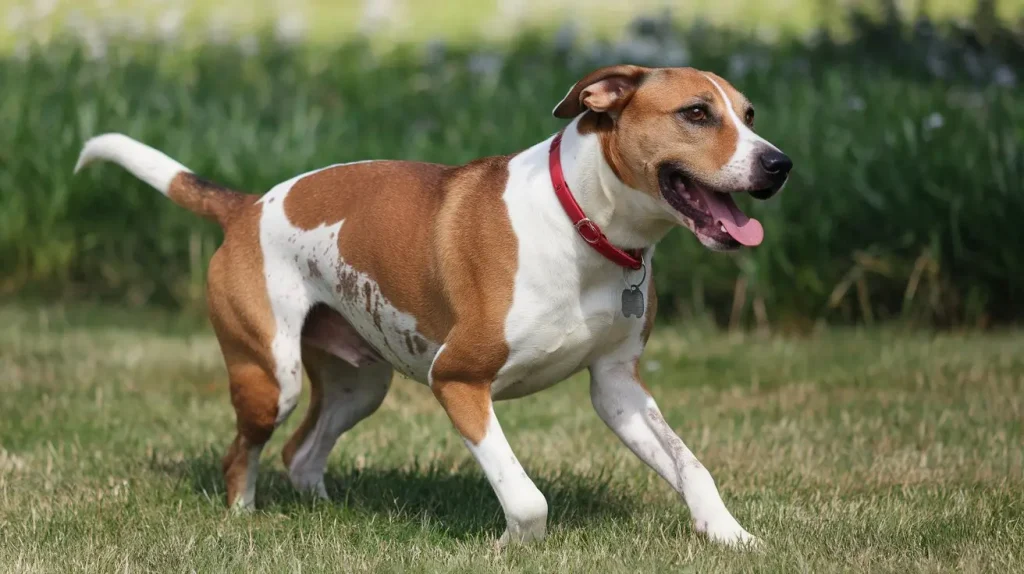
Prevention Tips for Avoiding Diarrhea in Dogs
While it’s not always possible to prevent diarrhea from occurring, there are several steps you can take to reduce the likelihood of your dog experiencing digestive upset. By proactively managing their diet, environment, and overall health, you can help ensure your dog maintains a healthy digestive system and reduce the chances of future diarrhea episodes. Here are some important prevention tips to keep your dog’s gastrointestinal health in check:
1. Gradually Transitioning to New Foods
One of the most common causes of diarrhea in dogs is a sudden change in their diet. If you’re switching your dog’s food—whether due to a change in brand, flavor, or formula—it’s important to do so gradually over the course of 7-10 days. A sudden switch can overwhelm their digestive system, leading to gastrointestinal upset, including diarrhea.
To transition foods safely:
- Start by mixing 25% of the new food with 75% of the old food for the first 2-3 days.
- Gradually increase the proportion of the new food while decreasing the old food over the next several days.
- Monitor your dog closely for any signs of digestive upset during this transition period.
By making this gradual change, you give your dog’s stomach time to adjust and avoid stressing their digestive system.
2. Avoiding Table Scraps and Human Foods
Feeding your dog table scraps or human food can lead to diarrhea and other gastrointestinal issues. Dogs’ digestive systems are not designed to handle the rich, fatty, or seasoned foods that we eat. Additionally, some human foods—such as chocolate, grapes, onions, garlic, and alcohol—are toxic to dogs and can lead to severe health issues, including diarrhea.
To prevent digestive upset:
- Stick to a balanced, high-quality dog food that meets your dog’s nutritional needs.
- If you want to give your dog treats, choose those specifically designed for dogs, ensuring they are safe and appropriate for their size and age.
- Keep all human food, especially toxic foods, out of your dog’s reach.
3. Preventing Access to Toxic Substances and Foreign Objects
Dogs are naturally curious and may chew or ingest things that can upset their stomach or cause blockages. Foreign objects such as plastic, rubber, fabric, or household cleaning products can lead to digestive disturbances, including diarrhea, and even more serious issues like blockages, which require veterinary intervention.
To avoid these issues:
- Ensure your home is dog-proofed by keeping dangerous items, such as small toys, chemicals, and trash, out of their reach.
- Supervise your dog when they are outside or when they have access to areas where harmful substances or objects may be present.
- If your dog has a tendency to eat things they shouldn’t, consider using a muzzle or keeping them in an enclosed area when you’re not around.
4. Managing Stress and Anxiety
Stress and anxiety can trigger gastrointestinal issues in dogs, including diarrhea. Changes in routine, travel, new environments, or even loud noises can upset your dog’s stomach. If your dog is particularly sensitive to stress, their digestive system may react with diarrhea, even when no other underlying health issue is present.
To reduce stress:
- Maintain a consistent routine for feeding, walks, playtime, and bedtime to help your dog feel secure.
- Avoid making sudden changes to your dog’s environment, and if you need to introduce changes, do so gradually.
- Use calming aids, such as pheromone diffusers, anxiety wraps, or calming supplements, if your dog is prone to stress.
5. Providing Proper Hydration
Dehydration can exacerbate the effects of diarrhea and can also lead to more severe health issues. Ensuring that your dog has access to fresh, clean water at all times is essential for maintaining their digestive health.
To encourage hydration:
- Provide fresh water throughout the day and ensure your dog drinks regularly.
- If your dog doesn’t drink enough water, try offering ice cubes, ice chips, or ice pops made from broth to entice them.
- Some dogs may prefer running water, so investing in a pet water fountain can help increase their water intake.
6. Regular Parasite Prevention
Parasites such as worms, Giardia, or Coccidia are common causes of diarrhea in dogs, especially if they are exposed to contaminated water or environments. Regular parasite prevention is key to reducing the risk of these infections and maintaining your dog’s gastrointestinal health.
To prevent parasites:
- Make sure your dog is on a regular deworming schedule, as advised by your veterinarian.
- Keep your dog away from areas known to be contaminated with feces or stagnant water (such as public parks, puddles, or rivers).
- Perform regular stool checks, especially for puppies, to monitor for signs of internal parasites.
7. Providing a Balanced, High-Quality Diet
Feeding your dog a balanced and high-quality diet that meets their specific nutritional needs is essential for maintaining their digestive health. A well-balanced diet ensures that your dog’s digestive system operates efficiently and reduces the risk of upset stomachs, including diarrhea.
To maintain a healthy diet:
- Choose dog food that is appropriate for your dog’s age, size, and breed. Different life stages (puppy, adult, senior) require different nutritional needs.
- Look for foods with high-quality protein sources, digestible carbohydrates, and healthy fats to support overall health and digestion.
- Avoid foods that are too rich in fat, artificial additives, or fillers, which can irritate the digestive system.
8. Exercise and Weight Management
Regular exercise is important for your dog’s overall health and digestion. Physical activity helps regulate their digestive system, and regular walks can help prevent constipation or diarrhea caused by lack of movement. Additionally, maintaining a healthy weight through diet and exercise can reduce the strain on your dog’s digestive system.
To encourage a healthy weight:
- Provide consistent daily exercise that is appropriate for your dog’s breed and energy level.
- Avoid overfeeding your dog, and ensure their food portions are in line with their recommended calorie intake based on their weight, age, and activity level.
- If your dog is overweight, consider consulting your veterinarian for a weight management plan to reduce the risk of gastrointestinal problems related to obesity.
9. Routine Veterinary Checkups
Regular veterinary checkups are essential for identifying potential health issues early on, including those that might cause diarrhea. Routine exams can help catch underlying conditions like food allergies, infections, or chronic gastrointestinal disorders before they become more serious.
To stay on top of your dog’s health:
- Schedule annual or semi-annual veterinary visits to ensure your dog’s health is monitored regularly.
- Keep up-to-date with vaccinations, flea and tick preventatives, and parasite control treatments.
- Discuss any concerns you may have regarding your dog’s diet, behavior, or gastrointestinal health with your veterinarian.
Conclusion : My Dog Has Diarrhea but Is Acting Fine
Mild diarrhea in a dog that is otherwise acting fine may not be a cause for immediate concern. Often, it can be the result of something as simple as a dietary change, mild stress, or a minor digestive upset that resolves on its own. As long as your dog remains energetic, continues to eat and drink, and shows no signs of serious distress, it’s usually safe to monitor the situation at home.
However, it’s essential to know when veterinary intervention is necessary. If the diarrhea lasts more than 24-48 hours, if blood or black stools are present, or if your dog shows signs of dehydration, vomiting, lethargy, or loss of appetite, it’s important to seek professional advice. Early intervention helps to ensure your dog gets the proper treatment and prevents the condition from worsening.
Finally, keeping your dog’s digestive system healthy is key to avoiding future diarrhea issues. Feeding a balanced diet, ensuring hydration, managing stress, and scheduling regular veterinary checkups can go a long way in maintaining your dog’s gastrointestinal health. By being proactive and mindful of their diet and environment, you can help your dog stay healthy and happy for years to come.

